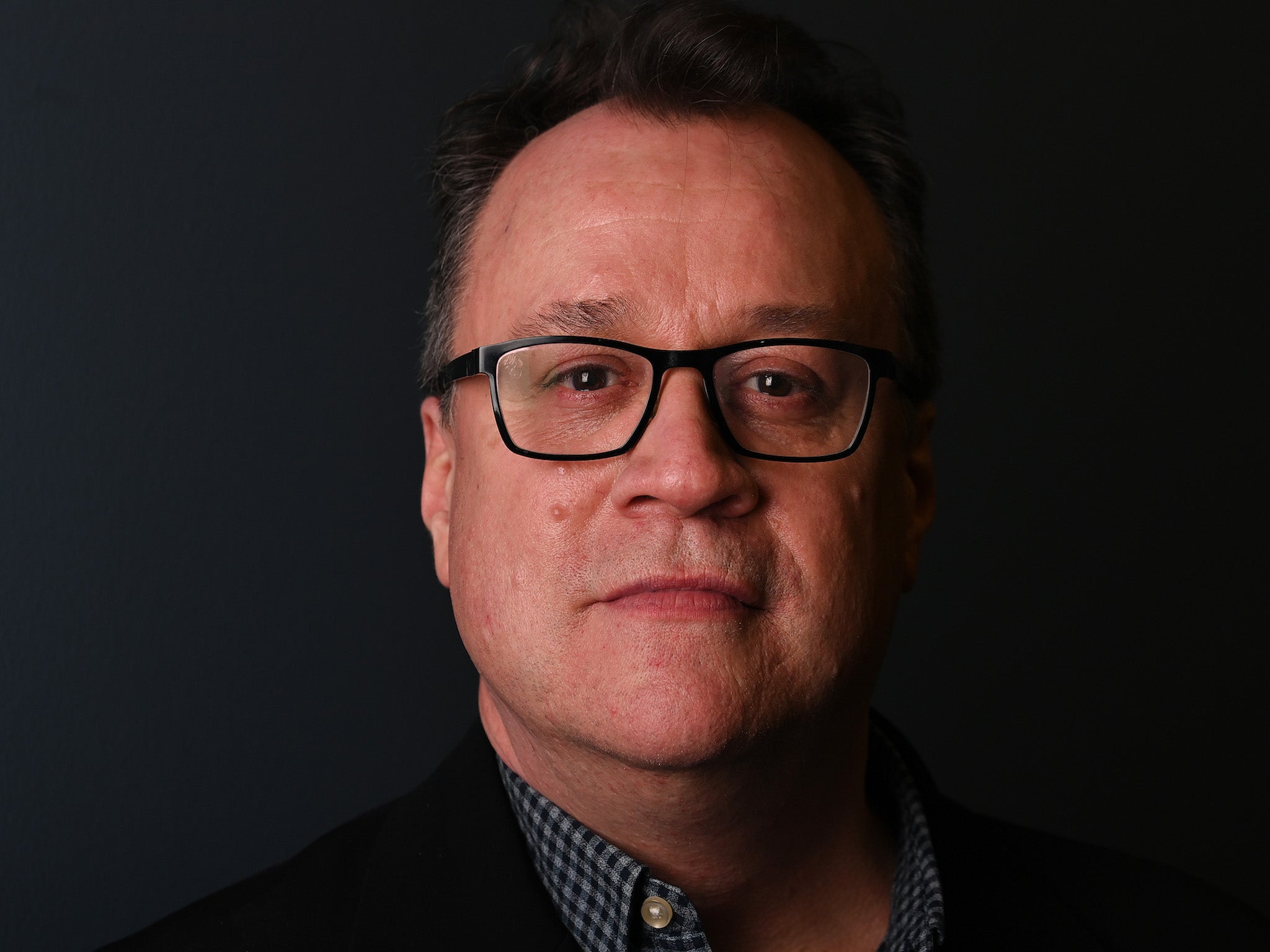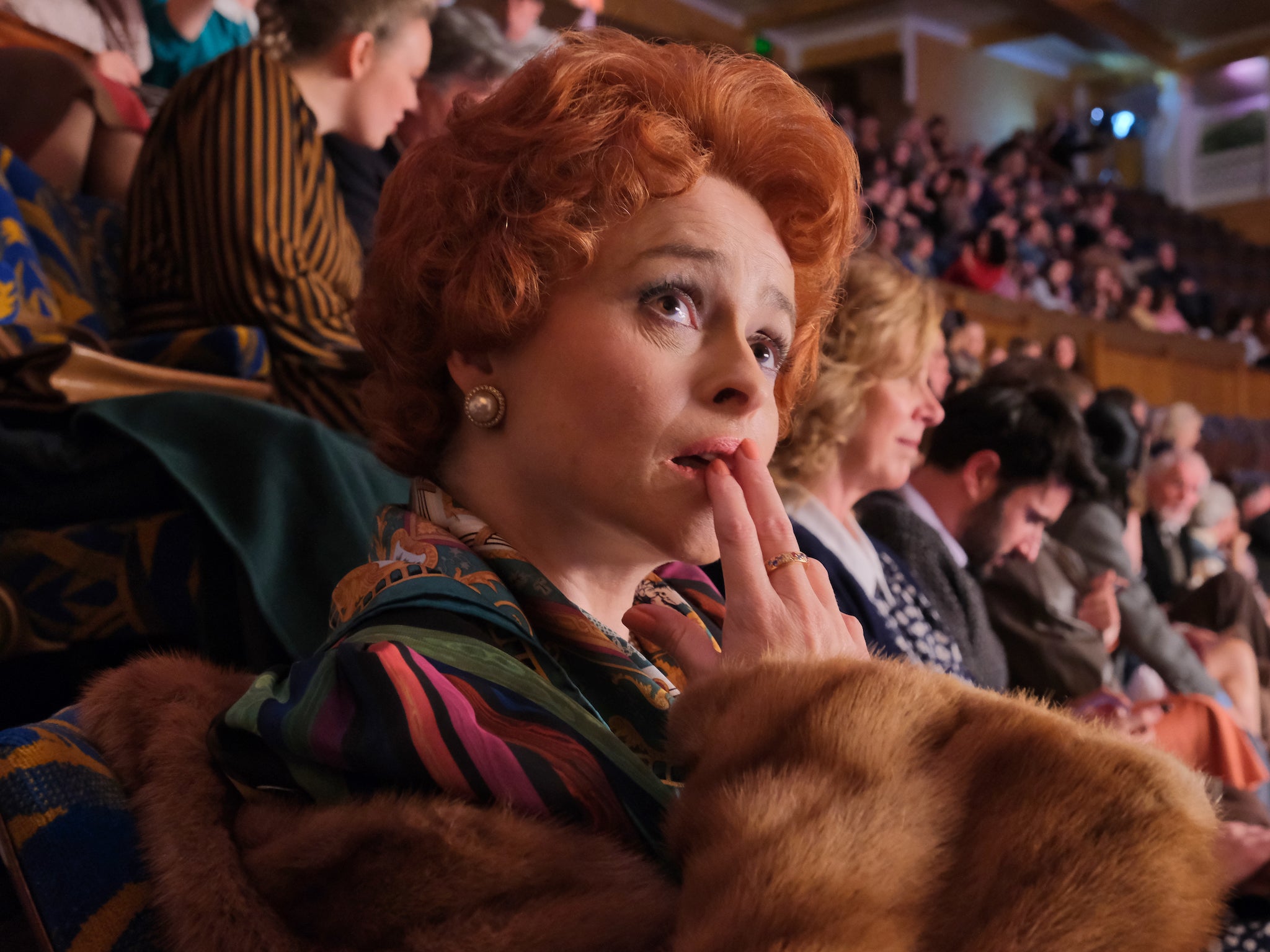‘People like me can make way for trans storytellers’: Russell T Davies on Nolly, Doctor Who, and making progress on screen
The much-loved writer speaks to Nick Levine about his new ITV drama ‘Nolly’ with Helena Bonham Carter, politics, trans representation – and those rumours that ‘Doctor Who’ has a £10m per episode budget

Everyone knows Russell T Davies is a great writer. Far fewer know he’s a great talker. By the time I meet Davies at a Soho hotel to discuss his latest TV drama, Nolly, a tremendously entertaining three-parter about Crossroads star Noele Gordon, the 59-year-old Welshman has been gabbing all day. He still has plenty of words for the conservative government, however, and their recently abandoned plan to privatise Channel 4. “We were all played by the right wing for a year defending Channel 4 and then they dropped it,” he booms, sounding both furious and friendly. “We were just like yo-yos.”
It’s fair to say that Davies has a vested interest in the subject. He worked with the not-for-profit channel on Queer As Folk, his seminal 1990s gay drama that was rebooted in the US for a second time last year, and It’s a Sin, his gut-wrenching series about the HIV/AIDS epidemic that broke Channel 4’s streaming records when it launched in 2021. In Davies’s eyes, the privatisation plan, spearheaded by former culture secretary and steadfast Boris Johnson ally Nadine Dorries, was a cynical ploy to make Channel 4 a pawn in the culture wars. “It was like we were in the schoolyard of Eton with the posh public schoolboys playing with us,” he says. “And then the matron is Nadine Dorries who comes in with a flannel to wipe up after the boys have been masturbating in thise dormitory.”
In person, Davies is as frank and funny as the characters he writes. There is one topic he won’t be drawn on, however: Doctor Who. To the delight of fans, he has recently returned as showrunner after a 13-year hiatus. Davies successfully revived the BBC’s formative sci-fi series in 2005. Now, with ratings flagging, he is the smart choice to give Doctor Who a spruce for its 60th anniversary. “We’ve still got 10 months [until my first episode] so I’m keeping my powder dry,” he says politely. “But you’ll see in November that it’s not a radically changed show. It’s lasted for 60 years because it’s good. It needs a bigger budget and a bigger profile, and hopefully that’s what we’re bringing to it.” With Disney Plus having acquired international streaming rights, Doctor Who is poised to benefit from world-class production values. Are they really spending £10m an episode? “I wish we had £10m!” Davies hoots. “If we did, I’d be flying around on a private jet.”
At a screening of Nolly eight hours earlier – Davies really has been talking all day – he recalled that when he initially pitched a series about Noele Gordon to ITV, the channel that broadcast Crossroads for nearly a quarter of a century, he was met with one question: “Who’s he?” The response only made Davies more determined to tell Gordon’s remarkable but sad story. Nolly is largely set in 1981 when Gordon, Crossroads’ biggest star and matriarch both on-and-off camera, is abruptly sacked without an explanation. “All good things come to an end,” is all the male executives offer. Helena Bonham Carter gives a spiky, sparkling performance as the actor who played motel owner Meg Richardson on Crossroads for 18 years before she was brutally ousted. When friends tell Nolly to inform the press she is leaving of her own volition, she disregards their advice entirely. Nolly marches up to the huddle of journalists waiting for her at the studio and declares: “Gentlemen, I have been sacked!”
It’s a world of creaky sets and squeaky RP accents, so memorably sent up by Victoria Wood in her Acorn Antiques sketches, but Davies believes the injustice of Gordon’s downfall will be keenly felt by contemporary audiences. “Inevitably, this series has things to say about women at work, and women in the workplace, because the way she was treated is still possible today and still abominable today,” he says. Her gender, too, Davies says, played a part in shaping her reputation. “In the industry, she was very much spoken of as a diva, a bit of a monster, a star,” he says. “And yet, when I went and spoke to the [Crossroads] cast, the opposite picture emerged. They very much loved her.”
Gordon wasn’t only an actor but also a genuine TV pioneer. She spent a year studying TV production at New York University, and then applied what she learned at ATV, the Midlands-based ITV franchise that launched in 1956. Two years later, she became the first woman to interview a sitting prime minister when she secured a scoop with Harold Macmillan. From 1957 to 1963, the year before Crossroads launched, Gordon helped to popularise daytime TV with the live entertainment show, Lunchbox. It was “the Loose Women of its day”, says Davies. “She had that skill as a producer and she knew about budgets, which put her in a remarkable position [as a woman]. But I think that also made her visible to men in power. They didn’t like that she had those skills, so in a way they became part of her downfall.”
Davies believes Gordon was also easier to topple because she didn’t fit any female archetypes of the time. “She wasn’t a mother or a wife, and she had no brothers and sisters, so there was no support structure to define her by,” he says. “That’s why Nolly says in episode three [of the series] that she was sacked because she was sackable.” While Gordon wasn’t gay – she had a lengthy relationship with a married man, theatrical impresario Val Parnell, that is mentioned in the series – Davies describes the actor as “completely gay-friendly” in a way that was far from the norm at the time. Her best friend, played gamely by Mark Gatiss, was the unapologetically camp but closeted TV presenter Larry Grayson.
“He was actually so bold and brave,” Davies says of Grayson. Other members of the LGBTQ+ community have been less complimentary. In 2017, LGBTQ+ activist Peter Tatchell said he “despised” the “negative, stereotypical representation of gay men” perpetuated in the 1970s by Grayson and Are You Being Served star John Inman. “He was being gay onstage,” continues Davies, who loved watching Grayson on the BBC primetime hit The Generation Game as a teenager. “His best friend was called Everard. What does that mean? It’s a reference to an erection! It was all so overtly gay and camp. People loved him and [yet] no one ever called him ‘gay’. I find that fascinating.”

Nolly isn’t as much a volte-face from It’s a Sin as it initially seems. “I think some people are surprised by the fact that I did this next, but you could never do another It’s a Sin. You’d be on a hiding to nothing,” he says. “And I know this [show] kind of doesn’t bear the weight of comparison in a way, but I was equally devoted to making it.” The events of Nolly begin in the same year as It’s a Sin. “In the autumn of 1981, [Olly Alexander’s character] Ritchie Tozer leaves home for London and walks into a world that is about to suffer a terrible plague,” says Davies. “And at the same time, up in Birmingham, a woman is being sacked from her job. They’re different versions of 1981 but I’m fascinated by that parallel. And in a way It’s a Sin led me to Nolly, which I had always wanted to write.”
I think some people are surprised by the fact that I did this next, but you could never do another ‘It’s a Sin’
Davies made headlines in 2021 when he said that gay characters should only be played by gay actors. “It’s about authenticity,” he said at the time. Considering he has been putting queer lives in living rooms since the 1990s, his words held a certain gravitas. So, is the next step to champion trans representation? “Without me, that’s happening,” he beams. Although he does allow himself a small pat on the back for casting Bethany Black in his 2015 then-E4 drama Banana and Cucumber. “She was the first trans actor in a regular terrestrial role in the world.” Davies has cast another trans actor, Heartstopper’s Yasmin Finney, in Doctor Who. Intriguingly, she is playing Rose – the same name as Billie Piper’s companion from Davies’s first stint in charge. “It will change the world,” Finney has said of her role.
Change is happening. Diversity onscreen is improving “across the board”, he says. “Good people are doing the work.” He continues: “It’s not just a trans thing. It’s about [showing] every form of sexuality and every race. And the point now is for gatekeepers like me to make way for trans storytellers, because that’s when you really improve things.”
No one can change the TV landscape on their own, Davies adds. He lightens the mood with a nice bit of self-deprecation. “And I’m getting old now, that’s the truth.” I can’t say I’m convinced. Even after talking about TV all day, he clearly has energy left to burn. “It’s all about stories for me,” Davies says. “And there’s always another story to tell.”
‘Nolly’ will be available to stream on 2 February on ITVX



Bookmark popover
Removed from bookmarks